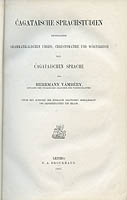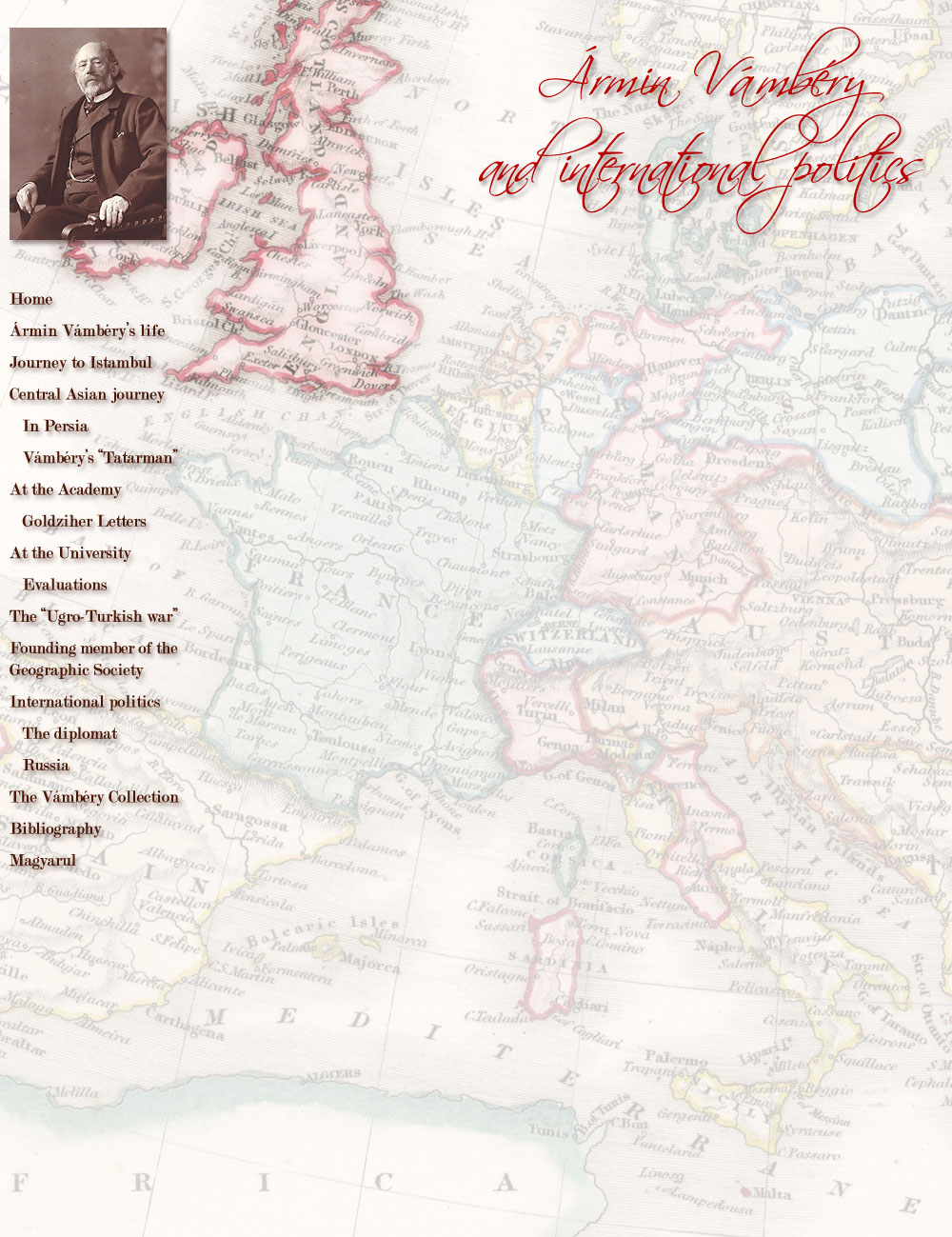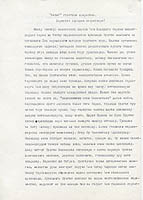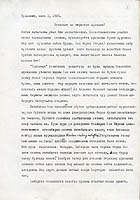 Mihály Dobrovits:
Mihály Dobrovits:
Vámbéry and Russia
When I first proposed the compilation of this short work to the
scholarly editorial Lilium Aurum in Dunaszerdahely, I was still firmly convinced
that I will draw from a much deeper source. Not that I did not know what Vámbéry
wrote about, since one single glance at the bibliographical description of his
works is enough to assess the subject of his works. Nevertheless, the closer I
got to the works of Vámbéry written on Russia, the greater was my disappointment
on realizing, how tight-fisted was this author in distributing information on
Russia, while at his time – as it is clearly noticeable to the Hungarian reader
from his late work, Nyugot kultúrája Keleten [The culture of the West in
the East] – he was the main adversary of the Russian colonial efforts, so much
that he had the courage to publish in this subject a series of articles, which
caused government crisis in his beloved Britain.
1
And even this few information was usually the review of elaboration of others’
works.
Not that he would have had any reason not to be talkative. The fearful “northern
neighbor” had been in the forefront of the Hungarian public for a long time,
either as the homeland of the ancient Hungarians and their relatives, or the
ally of the Hapsburgs and the unwise – because within a decade abandoned by the
Hapsburg, rescued by them – suppressor of the Hungarian war of independence of
1848-1849, or the adversary of the foreign politics of the Austro-Hungarian
Monarchy, painted with fierce colors, which were sometimes (as Vámbéry points it
out) even more fierce than necessary. Not to speak about the previous centuries,
it is enough to look at the Hungarian Age of Reforms in the early 19th century,
and the decades following it. The letter of a former Hungarian insurrectionist
officer who joined the Russian army of Peter the Great in 1716, sent from
Astrakhan to the Hungarian Szikszó, became a popular reading in the enlightened
Hungary, because its author first gave news about the castle of Magar,
that is, Magyar along the Kuma river and its ruler.
2
By the early 19th century this topos became a commonplace, and the area of the
city a place of pilgrimage.
3
Vámbéry, however, probably considered these reports an obsolete folly. The great
oeuvre of Reguly, about which he knew and always spoke with reverence,
4
was still virtually unexplored.
It must be also remembered, that Vámbéry first spoke about Russian affairs at
the Academy shortly after the end of the first phase of the
“Ugro-Turkish war”, in which he was defeated.
5
The scholar, who a few years earlier would have swept off any doubt concerning
his competence with the indignation of an offended dignity, now was forced to
face the fact that, while preserving his scholarly prestige, is not unassailable
and unquestionable any more. In today’s terms, Vámbéry, who never personally
visited Russia, could not risk.
On the other hand, Vámbéry’s work was published in the year, when it became clear that the European balance of power permanently changed. Metternich’s Europe, which more or less persisted in spite of large and small wars, was eroded by the events of the new times: the political unity of Germany and Italy was a fait accompli, the authority of the French politics was damaged by Sedan and the Commune, and the Austro-Hungarian Monarchy, just recently established after the Compromise of 1867, was also looking for its place. However, we are still some years before the Congress of Berlin, which will indeed define for decades the continent’s image. So Vámbéry could not make too bold statements.
With all that, Vámbéry’s Oroszország hatalmi állása Ázsiában [Russia’s power status in Asia] presents the objectives of Russian grand strategy almost with an engineer’s precision. A decade and half later he probably was pleased to think back on this early work, written – in the terms of the age – for “the educated public”. While not denying that he wrote on the subject on the basis of others’ pioneering works, the virtues of the future political analyst and political mediator already shine there in his writing. He foresaw the great Russian colonization plans and its preparations, as well as the necessary clash of the British and Russian interests in Asia. He also gave an accurate analysis about the Russian plans concerning Northeast-China (Manchuria).
True, Vámbéry was also influenced by the public opinion of the age, which saw the main effort of the Russian politics toward Europe in the energetically supported pan-Slavic endeavors. 6 Today we clearly see that the Russian politics was moved by considerably more rational forces. 7 The author, writing in 1871, predicted with an amazing foresight the precedents and potential consequences of the Russo-Turkish War of 1877-1878, including the Armenian question, which then still existed only in the bud, but has never since been healed. He exactly saw, although he was sometimes carried away by his emotions in this area, that the great powers should not destroy, but rather maintain the Ottoman Empire, since its weakening or fall would release such forces from the bottle, whose movement could have an unpredictable and disastrous effect on the Europe of the “happy times of peace”. The later activity of the author proves that he thought his allegations seriously. And, even sadder, history seems to have moved on the path indicated by Vámbéry’s works, so much it followed the predictions of the master. Perhaps if he published his opinion less vehemently, he could have had a greater effect on contemporary politics. After all, his emotions are embodied not only in direct expressions, but they are there in every line of the text, in his occasional drafting and typographical errors. Perhaps understandably. Vámbéry, who closely knew the Ottoman reality, saw well, that the Western world deceives itself if they believe that the upcoming Balkan and Middle Eastern landslides and their consequences, in which Russia plays an instrumental role, carry some kind of historical justice. His real politician’s habit withstood all romanticism.
It is sad nevertheless, that he committed some occasional errors for which Hammer-Purgstall would have rebuked him. Maybe his English source was not free of errors, but on the basis of his own knowledge we would expect more precision. On the other hand, Vámbéry, while writing about Russia, did not draw from that deep well which was opened by 19th-century travelers, such as Klaproth or Castro. 8 But the brief and insightful comments of the work richly compensate us for these deficiencies.
This insightfulness is seen in Vámbéry’s next work, the Orosz hadjárat Híva ellen [Russian campaign against Khiva]. His work is no original report, he was not present at this campaign, and on the basis of his previous book we can suspect that the last thing he would have wanted would have been to follow the Russian flags to Khiva, seen by him in the last days of its independence. 9 However, in addition to the Russian reports, his local knowledge was certainly of great help to him. He knew well the lcation of the events, and he met in person some of the main actors.
It is worth noting that the noise of the Russian weapons had not yet died away in Central Asia, and already another Hungarian, Bertalan Ónody provided the Hungarian audience with an up-to-date report on his Central Asian travel experiences. 10 Interestingly, we have not yet found any echo of his short publication in the contemporary scientific public opinion.
 Concerning
Vámbéry’s texts highlighted by us, the following can be said about them. His
writing about the Chuvash, although its material is now largely obsolete, at the
time of its publication, i.e. in 1883 it was considered a modern work. In
addition, it was to a certain extent groundbreaking in Hungarian linguistics.
And regarding its size, it is just long enough to allow insight into the
Hungarian Turcology in the last third of the 19th century. Vámbéry also wrote a
similar work about the Yakuts, but this is just informative literature for the
educated public entirely composed on the basis of secondary sources, lacking any
original knowledge.
11
Concerning
Vámbéry’s texts highlighted by us, the following can be said about them. His
writing about the Chuvash, although its material is now largely obsolete, at the
time of its publication, i.e. in 1883 it was considered a modern work. In
addition, it was to a certain extent groundbreaking in Hungarian linguistics.
And regarding its size, it is just long enough to allow insight into the
Hungarian Turcology in the last third of the 19th century. Vámbéry also wrote a
similar work about the Yakuts, but this is just informative literature for the
educated public entirely composed on the basis of secondary sources, lacking any
original knowledge.
11
More noteworthy are his writings on Tatar and Bashkir folklore. Although he
himself did not visit these people, in the possession of his Central Asian
experiences and of the knowledge of the Chagatai language, which at that time
still was the common literary language of the Eastern Turkic people, he could
almost deal with this topic as an original researcher.
Speaking about Russia, we cannot avoid the question of the relations between the minority elites and Vámbéry. Although this issue is still not definitively researched, we certainly know from the works of our Russian colleagues, that these relations did exist, and were by no means insignificant. 13 Thus we can safely assert that the analysis of the relationship between Vámbéry and Russia has more surprises in store for us.




















